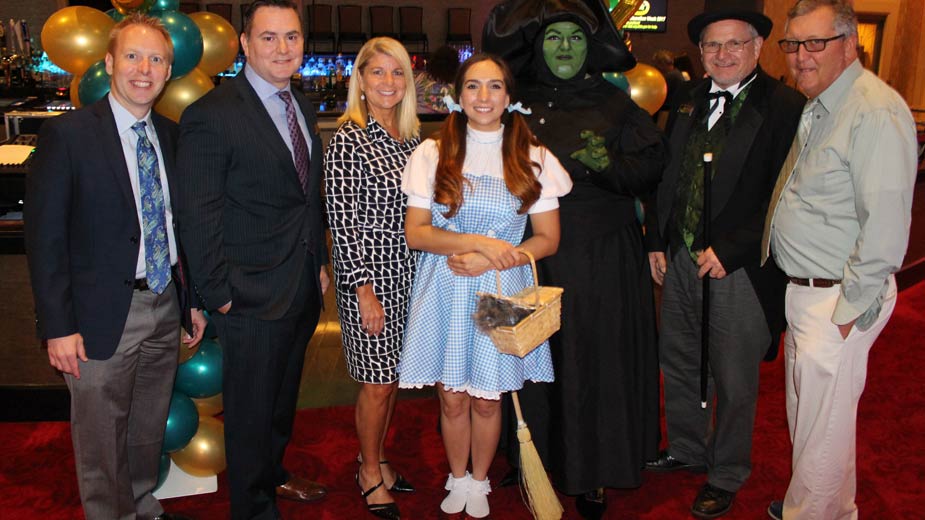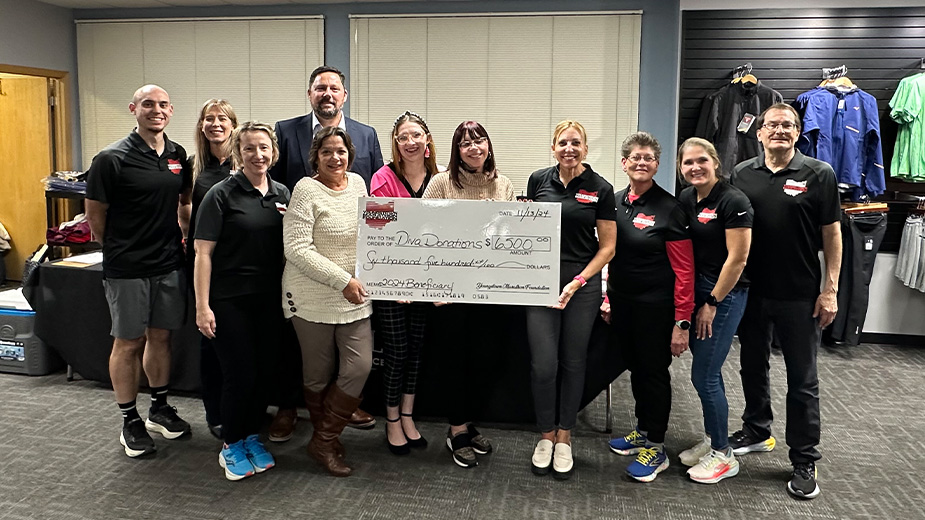‘Beat the Oddz’ Shines Light on Gambling Addiction
AUSTINTOWN, Ohio – The consequences of gambling in workplaces range from theft and embezzlement to lost productivity, but employers don’t always pay attention to the issue, local addiction counselors warn.
Counselors from Meridian HealthCare who specialize in gambling addiction were among those who attended Monday’s kickoff of Responsible Gaming Education Week at Hollywood Gaming at Mahoning Valley Race course. Meridian HealthCare is based in Youngstown.
“We are an entertainment facility and we don’t take that lightly,” said Tony Frabbiele, general manager at the racino. “There’s a lot of responsibility that comes with that.”
Many people come to the property but a “small percentage” can’t control their addiction to gambling, he said.
This year, the fight against gambling addiction based its theme – “Beat the Oddz” — on the classic film, “The Wizard of Oz.” Racino employees dressed up as characters from the movie. At Monday’s press event, a brief video showed “Dorothy” “swept away by a tornado of bad decisions,” as the “Scarecrow” put it, even signing away the deed to her house.
In the workplace, consequences of employees’ gambling addictions include embezzlement, fraud, lost time and lower productivity, said Stephanie Greer, one of two Meridian counselors who attended.
“Of course, we hear most about the big embezzlements and the thefts and stuff like that, ” said Stephanie Greer, one of two Meridian counselors on hand at the event.
“But the bigger issue has to do with the day-to-day employees who are spending their paychecks and being distracted by different gaming activities — the Super Bowl, March Madness and whatever,” added Lynne Burkey, another gambling counselor at Meridian.
People addicted to casino gambling and other forms of gambling are frequently distracted and “can’t wait to get out of work so they can go to the casino or go get scratch-offs,” Burkey continued. Workplaces pay insufficient attention to the problem, especially if they aren’t directly affected directly, he continued. And employee-assistance program counselors don’t always ask questions to determine the potential or existence of a gambling problem.
Before the launch of gambling at casinos and racinos in the state, a survey determined that about 2.5% of the population might have a gambling problem and up to 5% were at risk of having one, said Karen Russo, community outreach and problem gambling coordinator with the Ohio Lottery Commission.
As a result, the commission, which oversees gambling at the state’s casinos, launched its “Be the 95%” campaign, which provides tips on responsible gambling. “We are determining right now if there are more individuals at risk with another survey we are conducting,” Russo added.
Greer said she is “definitely” seeing an increase in the number of clients she at Meridian, although not necessarily all gamble at the Austintown racino. She also sees people with addictions to sports betting, the lottery and other types of gambling.
Mahoning County Commissioner David Ditzler, a speaker at yesterday’s program, told of a young friend hooked on gambling but seemed to have recovered. The commissioner learned that three months ago his friend fell into trouble again with his addiction.
“It’s something that you really can’t get away form unless you get help,” Ditzler said. “Like an alcohol addiction, you truly need professional help to get away from it.”
Ohio gives 0.5% of the commission it receives from casinos to programs that focus on problem gambling. Statewide, that amounted to $3.08 million for the fiscal year ended June 30, according to the most recently monthly reports. Of that, $354,306 came from the Austintown racino.
For the casinos and racinos, responsible gambing efforts don’t take place just one week of the year. “Every day, they are practicing responsible gaming initiatives,” Russo emphasized. Individuals can register themselves for voluntary exclusion programs to ban themselves from properties for a year, five years or permanently.
Brochures about problem gambling are prominently displayed near ATMs and at player services, and information is projected as well on the huge television screens throughout the racino, Frabbiele said.
“We educate our team members in the back of house for ways to look for problem gambling,” he added. Those signs often include people openly admitting they can’t make their house payment, for example, and admitting they can’t control their gambling. “Then we’ll do our best to assist them,” he said.
Pictured at top: Derek Longmeier, Problem Gambling Network of Ohio; Tony Frabbiele, Hollywood Gaming Mahoning Valley; Karen Russo, Ohio Lottery Commission; Genevieve Huba (Dorothy), Jenna Cintavey (Wicked Witch), and Herman Stein (Wizard of Oddz), Hollywood Gaming; Scott Anderson, Ohio Department of Mental Health and Addiction Services.
Copyright 2024 The Business Journal, Youngstown, Ohio.



